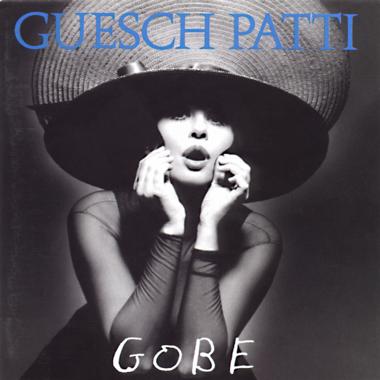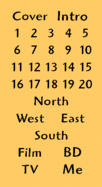(*) Interview in France Soir, 25 of April 2001.
© Yves Sabba/Claus Wickrath for the album cover.
@ Guesch Patti/Christophe Rose/EMI France for the music (excerpt).
© Per A.J. Andersson for the text. Written July 2003, updated November 2011.

Gobe
by Guesch Patti
| Guesch Patti has been in fashion. She has been out of fashion. She has been more places than most singers. For starters, few people have mixed French chanson à la Édith Piaf with pure rock so efficiently as she has. And she has been around for longer than people might suspect. — • — Patricia Porasse was born at the 16 of March 1946. She was nicknamed Guesch (a Basque naming) as a child, and Patti was a pet name for Patricia. Her father worked as an artistic director for a big record company, and aged nine Guesch was already on the scene, dancing the role of the Little Rat at the Paris Opera. For the next 30 years she would be working with dance, performing on TV shows, moving into contemporary dance and even being hailed as prima ballerina at La Scala in Milan (in 1976). When she was 19 she had a brief flirtation with singing, as one half of the duo Yves et Patricia, a venture she was talked into by her father. Two singles were released. So indeed, Guesch Patti was no teenage one-hit wonder, when in 1987 she came from, what seemed to most people, nowhere to lay all of France (and a handful of other European countries) to her feet with "Étienne". A slick and dynamic piece of rock made in the vein of Tina Turner et al. Sung in French. And accompanied with the most talked-about French music video of the year, a stylish but sexually daring piece. — • — The video was directed by Lydie Callier. She would be making a whole string of Guesch Patti videos in the years to come. These two had already been working together, making a try in the music business in 1984 with the trio DaCapo. Her success as a solo artist was the more remarkable. At that time modern French pop or rock rarely made it into non-French speaking territories. The international success of Étienne landed Guesch a record contract with EMI, the backing band Encore was formed around her and together they produced her first album. A second album followed in 1990, together with a tour spanning large parts of Europe. After an (amicable) split with Encore, a third album ("Gobe") saw the light in 1992. Sales were disappointing, and this was to be her last album for EMI. Which is a big shame. "Gobe" contains much of what Guesch Patti is at her very best. Tongue-in-cheek lyrics and an all-out exuberant energy ("Wake Up"), precise arrangements and hair-raisingly powerful vocals ("Promesses"), French chanson in modern arrangements ("Copie"). Maybe it was a lack of promotion, maybe it was the ever-changing taste of the public ear. — • — Or maybe Guesch Patti was too difficult to handle. She had always been prone to provocation, not avoiding the risqué in her songs and videos. But she also says no. "...I refuse to take part in shows making all kinds of clown acts! Me, I like the mystery; so I don't speak about my life, no photographs of my apartment..." (*) After a period of reflection she met French pop master Étienne Daho and gained renewed interest in creating music. She teamed up with independent French label XIIIBis Records and joined with sound artist Étienne Tikovoï in writing songs for the next record. The result was a tighter, more aggressive sound. A more dreamy, atmospheric "Blonde" caught the attention of British film director Peter Greenaway. Besides using it in his film "The Pillow Book" he directed the music video for the song. Further cinema experience came in 1997, when Guesch played the part as one of five 40-ish girlfriends trying to find the right foot to stand on, being at a crossroads in life. The film was "Elhas" ("Women") by Portuguese director Luis Galvão Teles, and alongside Guesch Patti was an international ensemble starring both Spanish Carmen Maura and American Marisa Berenson. — • — Guesch is regularly where she's not expected. In 2001 she returned to music with "Dernières nouvelles", which sounds more like a soundtrack to an unknown movie than anything else. It breathes an atmosphere of desolation and sentiment set in a autumn landscape. The following year the movie arrived. In the form of a DVD with video clips and a 52 minute long "performance-fiction", illustrating the songs on the album. She continues dividing her time between music, dance and cinema. It's fair to say she's a performer. On many levels. // |
|
GOBE •
Wake up Compositions:
Lou, C Rose, G Patti, Y Abadi, K MacBeth, Bobby Z. |
ALBUMS MORE
TO READ SIMILAR |

